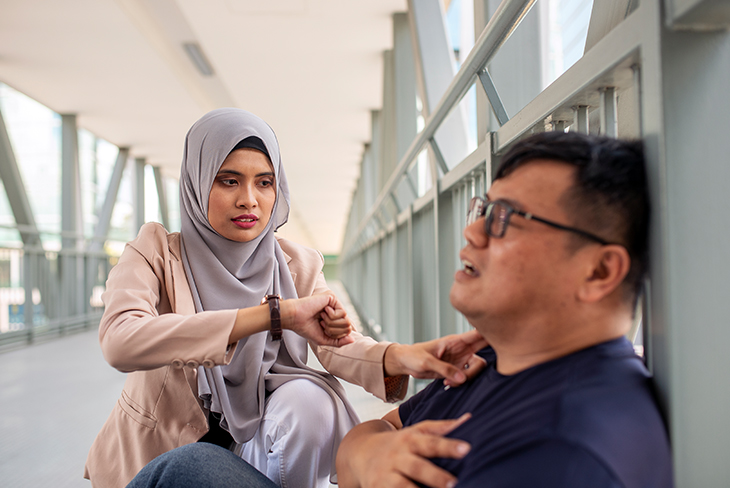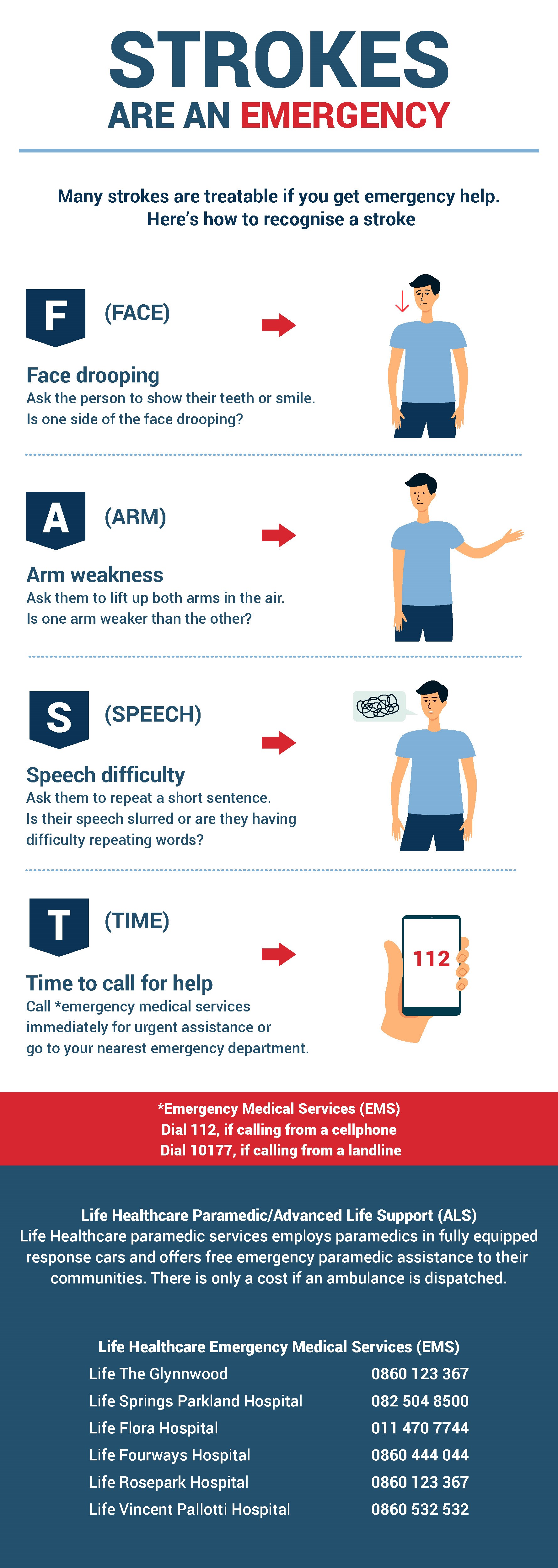Why is a stroke a medical emergency?

Every minute counts when it comes to strokes. We put together a guide to help you minimise the danger when having a stroke. Find out how to get immediate help.
A stroke is a serious life-threatening medical condition that occurs when the blood supply to a part of the brain is cut off. Strokes are a medical emergency and you should always seek medical attention. Here’s what you need to know about acting quickly
A stroke requires urgent medical attention and Dr Karisha Quarrie, Clinical Operations Manager: Clinical Directorate at Life Healthcare, recommends that we learn how to recognise the signs of a stroke and what to do when someone is having a stroke.
‘The brain requires oxygen and other nutrients, which are carried in the blood, for normal function,’ explains Dr Quarrie. ‘A stroke, or cerebro-vascular accident (CVA), occurs when this supply of blood is interrupted and can result in death or severe disability if not diagnosed correctly or treated timeously.’
Don’t delay – get help
‘A patient suffering a stroke may develop suspicious symptoms such as facial drooping, arm weakness or speech difficulties,’ says Dr Quarrie. ‘For every minute that the blood flow is interrupted, the brain is damaged and almost two million brain cells or more are lost.
‘Seeking medical attention swiftly can assist in confirming the diagnosis, which may include scanning the brain to determine the type and extent of the stroke.’
Signs of a stroke
Dr Quarrie recommends learning the internationally recognised memory tool for stroke, which is F.A.S.T. ‘This acronym stands for: Facial drooping, Arm weakness, Speech difficulties and Time to call emergency services.’


How to do the F.A.S.T. test
Face: Ask the patient to smile. Is one side of the face drooping?
Arm: Ask the patient to lift their arms. Is one arm weaker than the other?
Speech: Ask the patient to read a sentence out loud. Is their speech slurred?
Time: If the patient has even one symptom, it could be an indicator of a stroke and it is time for a doctor to examine the patient.
Time is brain
‘A patient who develops these symptoms must seek medical attention swiftly, and there are various types of therapy available,’ says Dr Quarrie.
‘Scientific studies show that patients who are diagnosed with a stroke within four hours of the onset of symptoms have the best outcomes, especially in terms of reversing disability.’
What’s the difference: ischaemic stroke vs haemorrhagic stroke
Dr Quarrie explains the difference between ischaemic and haemorrhagic stroke and a transient ischaemic attack (TIA):
- Ischaemic stroke is any reduction in blood flow resulting in decreased oxygen and nutrient supplies to a tissue. An ischaemic stroke occurs when a blood vessel in the brain is blocked with a clot and can result in brain-cell death. This is the most common type of stroke. The causes and pathology are similar to blocked coronary vessels causing a heart attack.
- Haemorrhagic stroke occurs when a blood vessel in the brain bursts because the blood vessel is weak or diseased, as may occur in patients with hypertension. When the vessel bursts, blood leaks out of the vessel and into the brain tissue and can result in further brain damage and ischaemia.
A TIA is the temporary lack of blood flow and is sometimes called a ‘mini stroke’ and it may be a precursor to a stroke.
What NOT to do if you suspect someone has had a stroke:
- ignore the situation and let them go to sleep
- let them drive or operate machinery
- let them dissuade you from calling the paramedics
- allow them to eat, take medication or drink
There are many lifestyle adjustments that can reduce the risk of stroke:
- a balanced diet and weight control
- regular exercise
- stopping smoking
- knowing your numbers – particularly if you have hypertension
- reducing stress
- prioritising mental wellbeing
Life Healthcare’s emergency units are located at 41 Life Healthcare hospitals and offer emergency medical services 24 hours a day, seven days a week. Doctors, experienced nursing staff and specialists are available to ensure every patient receives the best emergency care.
Important: All our emergency units remain open at all times. Save your nearest Life Healthcare emergency unit contact details in your mobile phone in case of medical emergencies.
The information is shared on condition that readers will make their own determination, including seeking advice from a healthcare professional. E&OE. Life Healthcare Group Ltd does not accept any responsibility for any loss or damage suffered by the reader as a result of the information provided.

